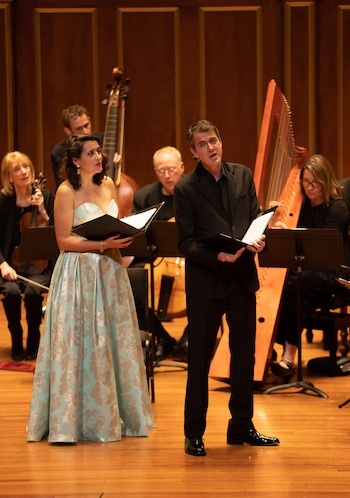Opera Review: BEMF’s “La storia di Orfeo” — A Musical Triumph
I do not know how BEMF will ever top this. Bravo tutti!
By Susan Miron
Boston Early Music Festival Orchestra
Paul O’Dette & Stephen Stubbs, Musical Directors
Robert Mealy, Concertmaster

Amanda Forsythe and Philippe Jaroussky singing in BEMF’s “La storia di Orfeo.” Photo courtesy of the BEMF.
For ten years now, The Boston Early Music Festival (BEMF)’s Thanksgiving chamber opera has been one of my year’s highlights, but this year brought something special — the world-renowned countertenor Philippe Jaroussky. With no scenery or dancing, this beloved megastar and Boston’s “own” soprano superstar Amanda Forsythe performed an ingenious pastiche, conceived of by Jaroussky, of several early operas based on the Orpheus legend. It was a musical triumph.
Entitled La storia di Orfeo, this delightful two-hour show seemed to fly by. For the BEMF, Jaroussky created a pastiche opera for the concert stage by drawing on scenes from three different operatic versions of the tale: Claudio Monteverdi’s L’Orfeo, first performed for a courtly audience in Mantua in 1607; Luigi Rossi’s L’Orfeo, composed for the French court and performed at the Palais Royal in Paris in 1647, and Antonio Sartorio’s L’Orfeo, first performed at a public theater in Venice in 1672. Aptly chosen instrumental works by contemporaneous composers provided entertaining interludes between the vocal numbers. The production moved seamlessly from one composer to the next, with the operas by Sartorio and Rossi focusing on the joy of the famous young lovers and the tragic scene where Eurydice is bitten by a snake and instantly perishes. Monteverdi’s celebrated Orpheus chooses to focus on Orfeo’s mythic search for his beloved in the underworld. From this opera, Jaroussky gave a plangent and unforgettable performance of its most famous eight-minute-long aria, “Possente spirito.” (You can hear him do this on You Tube L’Orfeo, SV 318, Act 2 .) The aria is decidedly not written for countertenor, but it was fabulously sung nevertheless. Full of death-defying coloratura, the aria showcases the divine singing power of a heartbroken demigod, a poet whose voice and lyre could tame and charm savage beasts.
Jaroussky’s pastiche belongs to a long tradition of composite operas in the 17th, 18th, and 19th centuries, when arias were inserted and removed according to the whims and talents of available singers. Instrumental concerts featuring vocal numbers often interrupted a sequence of symphonic movements. In addition to the arias from the three Orfeo operas, Jaroussky included a scene from Agostino Steffani’s Orlando generoso, which BEMF performed in June 2019. (See Arts Fuse review) It worked wonderfully, evoking the despair of parted lovers — which are not Orpheus or Eurydice. (Jaroussky’s last important appearance with BEMF was in Steffani’s Niobe, Regina di Tebe in 2011, also with Amanda Forsythe).
Forsythe has carved out a quite spectacular career worldwide in early music; the Boston press treats her as a beloved local demigoddess. Here, she looked and sounded absolutely resplendent. When she sang from the balcony (Hades), it was particularly breathtaking. She has an appealing smile and stage presence, and she held her own as a beguiling but cursed Eurydice. The packed audience at Jordan Hall could not get enough of her and Jaroussky; the pair generously offered a thrilling encore, the wonderful final duet from Monteverdi’s L’incoronazione di Poppea, “Pur ti miro.”
The BEMF orchestra under the leadership of concertmaster Robert Mealy was its usual superb self. The continuo section was splendid, particularly (yes, I always single her out, because she is extraordinary, both technically and musically) Baroque harpist Maxine Eilander. She was usually strong throughout the second half. But the entire ensemble deserves plaudits. I do not know how BEMF will ever top this. Bravo tutti! Come back soon, Philippe Jaroussky! Boston adores you! Thank you BEMF!
Susan Miron, a harpist, has been a book reviewer for over 30 years for a large variety of literary publications and newspapers. Her fields of expertise were East and Central European, Irish, and Israeli literature. Susan covers classical music for The Arts Fuse and The Boston Musical Intelligencer.
